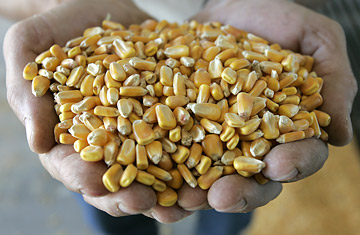
A handful of corn before it is processed at the Tall Corn Ethanol plant in Coon Rapids, Iowa.
Like much of the rest of the world, Europe has invested heaps of money and even more hope in the promise of biofuels to provide secure supplies of environmentally friendly energy. But now rising food prices, trade tensions and social unrest are prompting a rethink of the E.U.'s ambitious hopes for running its cars and trucks on biofuel.
The latest call for a change of course came from economist Jeffrey Sachs, special adviser to U.N. Secretary General Ban Ki-moon, who this week urged the European Parliament to scrap the E.U.'s much-touted target of increasing biofuel's share in Europe's diesel and gasoline consumption to 10% by 2020. Last year, E.U. governments spent an estimated € 3.7 billion ($5.2 billion) on subsidising biofuel production.
Sachs, who also criticized the U.S. biofuels program, said biofuels compete with food for farming land and help push up food prices, hurting the world's poor worst of all. "We need to cut back significantly on our biofuels programs," he said. "They were understandable at a time of much lower food prices and larger food stocks but do not make sense now in a global food scarcity condition."
It was only one blow in the pummeling biofuels have taken recently, not least in a TIME cover story. In April a World Bank report accused biofuel production of pushing up feedstock prices, and Jean Ziegler, the U.N. Special Rapporteur for the Right to Food, called biofuels production "a crime against humanity" because of its impact on global food prices.
Even business has got into the act. Peter Brabeck-Letmathe, head of Nestlé , the world's largest food and drink company, said the enormous biofuel subsidies being proffered by Brussels and Washington are "morally unacceptable and irresponsible." And environmental groups, which championed biofuels just a few years ago, have warned that they might even be worse than fossil fuels. "Biofuels are no green panacea," says Adrian Bebb, a spokesman for Friends of the Earth. "They can damage the climate and wreck rainforests. The public is being conned if it thinks they are a green solution."
The European Environment Agency, which advises the European Commission, has recommended that the E.U. suspend its 10% biofuels target, calling it an "overambitious experiment whose unintended effects are difficult to predict and difficult to control."
But the E.U.'s key trade and farm officials haven't adopted the newly negative line on biofuels. Trade Commissioner Peter Mandelson insists that the 10% target is still attainable and argues that the E.U.'s biofuels policy has had only a minimal impact on world food prices. Mandelson has tried to shift the blame to the U.S. and the subsidies that are driving up to one third of its maize crop into ethanol production.
The issue risks descending into a conventional trade war after European biodiesel producers earlier this month asked the Commission to slap punitive duties on surging U.S. biodiesel imports. The European Biodiesel Board (EBB) says European producers are being put out of business by U.S. imports of so-called B99 biodiesel, or fuel derived 99% from plants. The U.S. government subsidizes such exports to the tune of up to $300 a ton. Yet in some cases, the bulk of the fuel doesn't even stem from U.S. inputs, but is cheaply imported from countries like Indonesia or Malaysia.
For her part, E.U. Agriculture Commissioner Mariann Fischer Boel protests that biofuels had become a scapegoat. She said that the E.U. uses less than 1% of its cereal production to make ethanol, and while two-thirds of Europe's rapeseed crop is used for biodiesel, this accounts for only about 2% of global oilseed demand.
In any case, the Commission plans to tighten the criteria to ensure that biofuel production is sustainable, including a stipulation that it represent a 35% carbon saving compared to oil. Fischer Boel sets much store on the shift from first wave of biofuels (made from wheat, maize, colza, sugar beet etc) to second generation (leaves, straw and pond algae). If she's right, it could maintain the initial promise of biofuels. But as the chorus of critics grows louder, Europe's ambitious goals for filling its tanks with the fruits of the fields are looking more and more like pipedreams.
